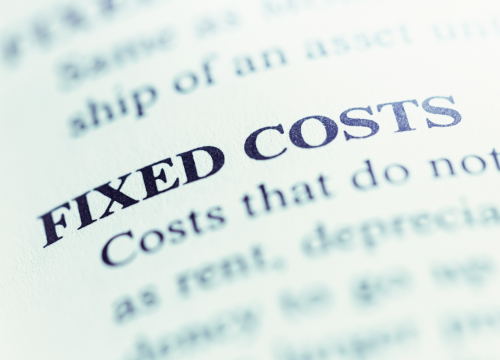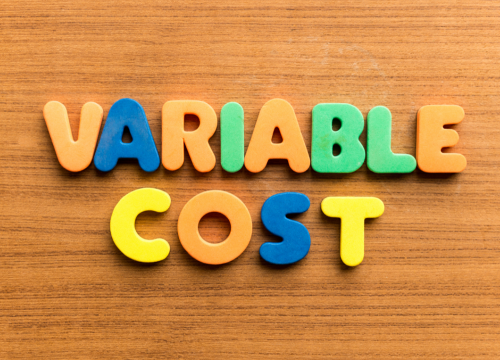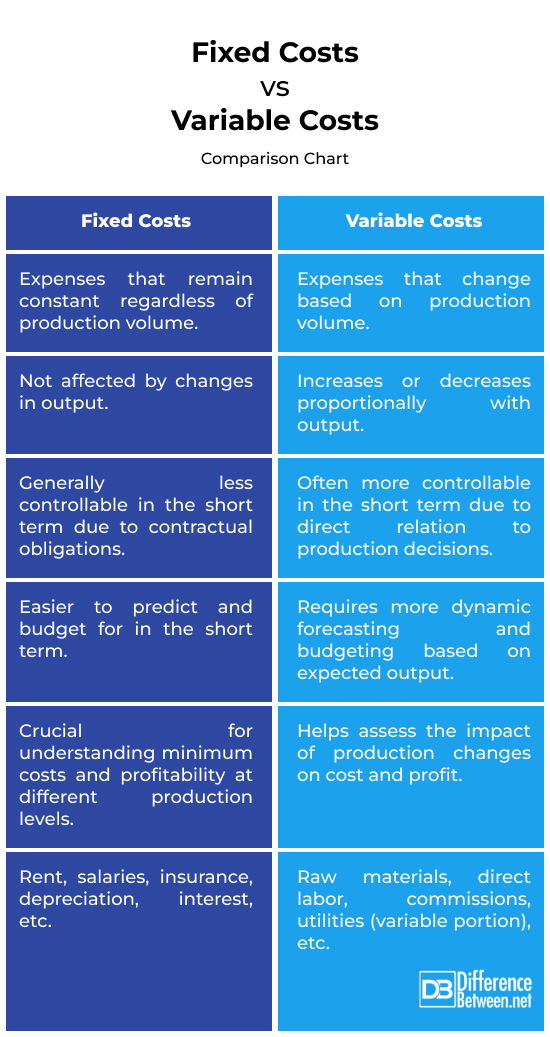Difference Between Fixed and Variable Costs
There are two main types of costs in business: variable costs and fixed costs. These are the expenses a company deals with when producing stuff or offering services. Variable costs change based on how much the company produces. So, if they make more things, these costs will go up. Fixed costs, on the other hand, stay the same no matter how much is produced.
Here’s a brief comparison of fixed and variable costs to help you manage your money better.

Fixed Costs
Fixed costs are the expenses that are independent of the volume of production. These are the expenses that a company has to pay regularly. They don’t change much, even if the company produces more or less. These costs remain constant over a specific period, like a month or a year. They’re like the consistent bills a company has to pay.
The most common examples of fixed costs include rent or lease payments, salaries and wages, insurance premiums, loan payments, utilities, etc. Understanding fixed costs is crucial for businesses as they need to cover these expenses regularly, regardless of their production or sales levels.

Variable Costs
Variable costs are expenses that change proportionally with the level of production or business activity. Unlike fixed costs, variable costs go up when production increases and decrease when production decreases. These costs are directly linked to the quantity of goods or services a company produces.
The most common examples of variable costs may include raw materials, labor costs, utility expenses, packaging materials, shipping and freight costs, etc. These costs are dynamic and respond to changes in business operations.
Difference between Fixed and Variable Costs
Nature of Expenses
Fixed costs are consistent, regular expenses that do not change with the level of production or business activity. They stay the same regardless of how much a company produces or sells.
Variable costs vary in direct proportion to the level of production or business activity. As production increases, variable costs go up, and they decrease when production decreases. These expenses fluctuate based on the volume of production.
Stability
Fixed costs remain constant irrespective of changes in production or sales. They bring stability to a company’s budget but require consistent coverage.
Variable costs are more flexible and responsive to changes in business operations. They adjust as the production levels shift.
Budgeting and Planning
Fixed costs require careful budgeting as they need to be covered regularly. Since they remain stable, companies can plan for them more easily. They are relevant for calculating the break-even point (where total cost equals total revenue).
Variable costs demand a more flexible budgeting approach, considering that they change with production levels. Companies should anticipate these changes to make informed financial decisions. They are used to determine the contribution margin (revenue per unit minus variable cost per unit).
Examples
Fixed costs include rent or lease payments, salaries and wages (for fixed-salary employees), insurance premiums, loan payments, and other consistent monthly or yearly expenses.
Variable costs include costs of raw materials, labor directly tied to production, packaging materials, shipping and freight costs, and other expenses that vary based on the quantity of goods or services produced.
Fixed Costs vs. Variable Costs: Comparison Chart

Summary
In a nutshell, variable costs go up or down with production, while fixed costs stay steady. It’s like knowing the different parts of your monthly bills—some change, and some stay the same. Simply put, fixed costs remain constant regardless of production volume, while variable costs change based on production volume.
FAQs
What is the difference between fixed and variable expenses giving an example of each?
The most common example of a fixed cost is the rent for office space. This cost remains constant regardless of the level of production or business activity.
The most common example of variable costs is the cost of raw materials. As production increases, the need for raw materials goes up, making it a variable expense.
What is an example of a variable cost?
Raw material costs are a classic example of a variable cost. The more units a company produces, the more raw materials it needs, leading to an increase in variable costs.
What are the fixed and variable cost statements?
These are financial statements that sort expenses into fixed and variable costs. They show a clear breakdown of the different kinds of spending a company does.
What are examples of fixed costs?
Rent or lease payments, salaries for fixed-salary employees, insurance premiums, loan payments, and other consistent, regular expenses.
What are examples of fixed expenses?
Fixed expenses include rent or mortgage payments, insurance premiums, loan payments, and subscription services. These are costs that remain constant over a specific period.
What is meant by fixed cost?
Fixed costs are regular, consistent expenses that do not change with the level of production or business activity. They stay the same regardless of how much a company produces or sells.
Is labor a variable or fixed cost?
Labor costs can be both variable and fixed. If employees are paid per unit produced or on an hourly basis directly tied to production levels, it’s variable. If they receive a fixed salary, it falls under fixed costs.
What costs include both fixed and variable costs?
Total costs include both fixed and variable costs. The total cost to produce a certain quantity of goods or services is the sum of fixed and variable costs.
- Difference Between Caucus and Primary - June 18, 2024
- Difference Between PPO and POS - May 30, 2024
- Difference Between RFID and NFC - May 28, 2024
Search DifferenceBetween.net :
Leave a Response
References :
[0]Image credit: https://www.canva.com/photos/MADBHF7kcHI-variable-cost/
[1]Image credit: https://www.canva.com/photos/MAEE0APKVwI-business-definitions-fixed-costs/
[2]“What is Fixed Cost vs Variable Cost?” FreshBooks, www.freshbooks.com/hub/accounting/fixed-cost-vs-variable-cost. Accessed 29 Jan. 2024.
[3]Strydom, Lorien. “Fixed vs. Variable Cost: What’s the Difference?” The Balance, 30 Dec. 2021, www.thebalancemoney.com/fixed-vs-variable-cost-5194301.
[4]Vipond, Tim. “Fixed and Variable Costs.” CFI, corporatefinanceinstitute.com/resources/accounting/fixed-and-variable-costs/. Accessed 29 Jan. 2024.
[5]Nickolas, Steven. “Variable Cost vs. Fixed Cost: What's the Difference?” Investopedia, 10 July 2022, www.investopedia.com/ask/answers/032515/what-difference-between-variable-cost-and-fixed-cost-economics.asp.
